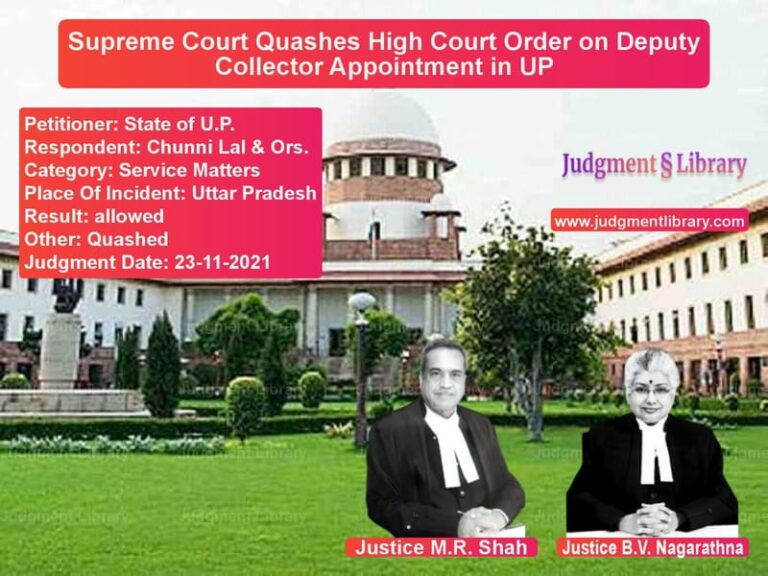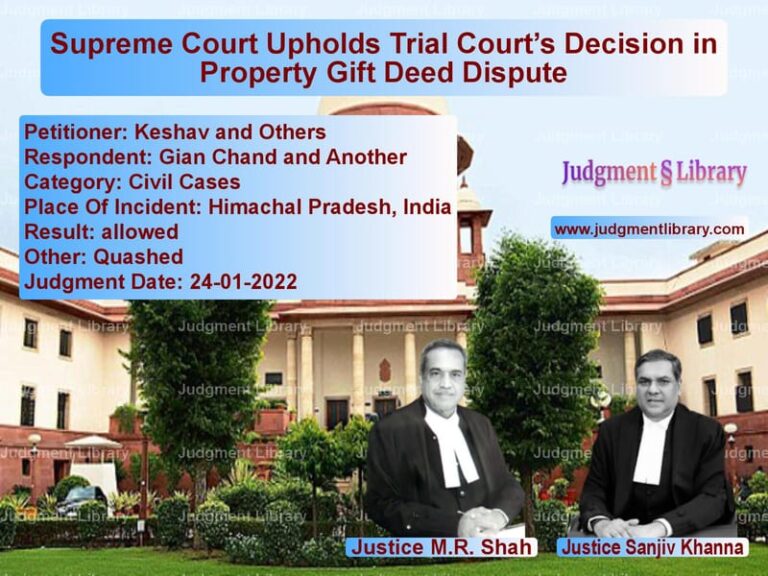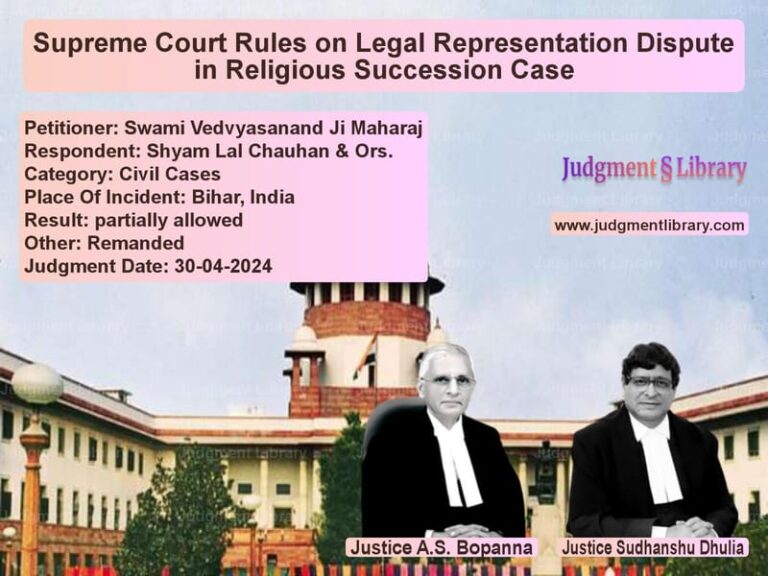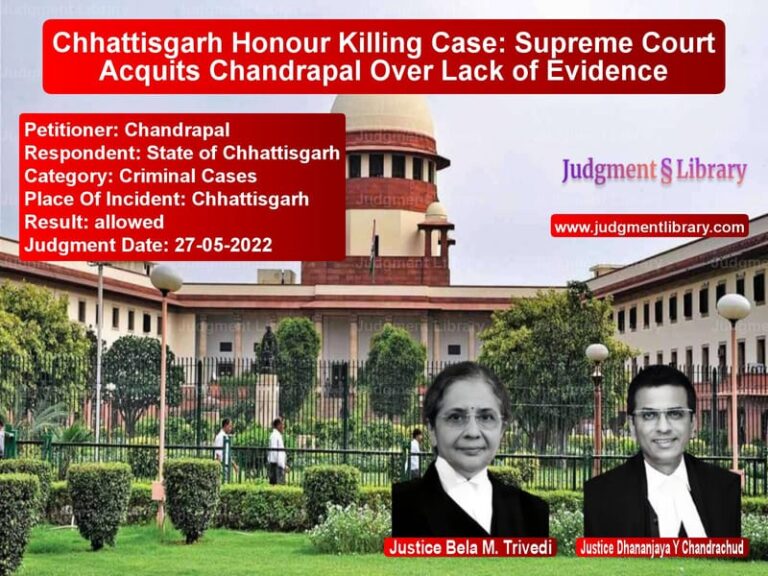Supreme Court Sets Aside Karnataka High Court’s Injunction in Bengaluru Property Dispute
The case of Acqua Borewell Pvt. Ltd. v. Swayam Prabha & Others revolves around a property dispute in Bengaluru concerning the partition and ownership rights of various properties. The Supreme Court quashed the Karnataka High Court’s order granting an interim injunction on a 1/7th share of the total properties, ruling that third parties who claimed rights over some of these properties were not given an opportunity to be heard.
The ruling emphasizes the necessity of procedural fairness in property disputes and underscores that no injunction can be granted without hearing all affected parties, especially those claiming legal rights over the disputed assets.
Background of the Case
The dispute originated when some respondents (plaintiffs in the original suit) filed a case (O.S. No. 4709/2019) before the trial court, seeking a declaration of their entitlement to a 1/7th share in the properties inherited from their mother, Laxmi Devi. They also sought to void a settlement deed executed in 2015.
The properties in dispute consisted of multiple assets (A1 to A40), some of which were owned by firms, trusts, and companies that were not parties to the suit. The trial court initially refused to grant an injunction against the defendants, citing that some properties belonged to entities not included in the suit.
Aggrieved by this decision, some plaintiffs appealed to the Karnataka High Court, which partially allowed their appeal and imposed an injunction on the alienation of a 1/7th share of the total properties until the case’s final disposal.
Challenging this decision, third parties who claimed legal rights over some properties approached the Supreme Court, arguing that they were not given an opportunity to be heard before the injunction was granted.
Arguments by the Petitioner
The appellants, Acqua Borewell Pvt. Ltd. and other third parties, contended:
- Some of the disputed properties were subject to valid development agreements, and they had acquired legal rights over them.
- The trial court had rightly observed that some properties were owned by firms, trusts, and companies that were not part of the suit.
- The High Court, without impleading these third parties, granted an injunction affecting their legal interests.
- Without disposing of the pending applications to implead the appellants as parties, the High Court could not have granted an injunction against their rights.
Arguments by the Respondent
The original plaintiffs/respondents countered:
- The properties in question were part of the family estate and should not have been alienated without a proper partition.
- The High Court acted within its jurisdiction in granting a limited injunction to protect their rights.
- The trial court’s refusal to grant an injunction ignored their legitimate claims over the disputed properties.
Supreme Court’s Judgment
The Supreme Court, comprising Justices M.R. Shah and B.V. Nagarathna, ruled in favor of the appellants and set aside the High Court’s order, stating:
“Before granting any injunction with respect to the properties in which the appellants claim right, title, or interest, they ought to have been given an opportunity of being heard.”
The Court found that:
- The High Court granted an injunction affecting third parties without first deciding their applications to be impleaded as necessary parties.
- The trial court had correctly noted that some properties were owned by legal entities not made part of the suit.
- The plaintiffs themselves had filed applications to include these third parties as necessary defendants, acknowledging their legal interests.
The Court directed the trial court to first decide the pending applications for impleading the appellants as necessary parties. If the appellants were impleaded, the trial court would then reconsider the injunction application afresh.
Conclusion
The ruling reinforces that property disputes require strict adherence to procedural fairness, ensuring that all affected parties are heard before any injunction affecting their rights is granted. The Supreme Court’s decision ensures that due process is followed in such cases, preventing any prejudicial orders without a fair hearing.
Petitioner Name: Acqua Borewell Pvt. Ltd..Respondent Name: Swayam Prabha & Others.Judgment By: Justice M.R. Shah, Justice B.V. Nagarathna.Place Of Incident: Bengaluru, Karnataka.Judgment Date: 17-11-2021.
Don’t miss out on the full details! Download the complete judgment in PDF format below and gain valuable insights instantly!
Download Judgment: acqua-borewell-pvt.-vs-swayam-prabha-&-othe-supreme-court-of-india-judgment-dated-17-11-2021.pdf
Directly Download Judgment: Directly download this Judgment
See all petitions in Property Disputes
See all petitions in Landlord-Tenant Disputes
See all petitions in Specific Performance
See all petitions in Judgment by Mukeshkumar Rasikbhai Shah
See all petitions in Judgment by B.V. Nagarathna
See all petitions in allowed
See all petitions in supreme court of India judgments November 2021
See all petitions in 2021 judgments
See all posts in Civil Cases Category
See all allowed petitions in Civil Cases Category
See all Dismissed petitions in Civil Cases Category
See all partially allowed petitions in Civil Cases Category







